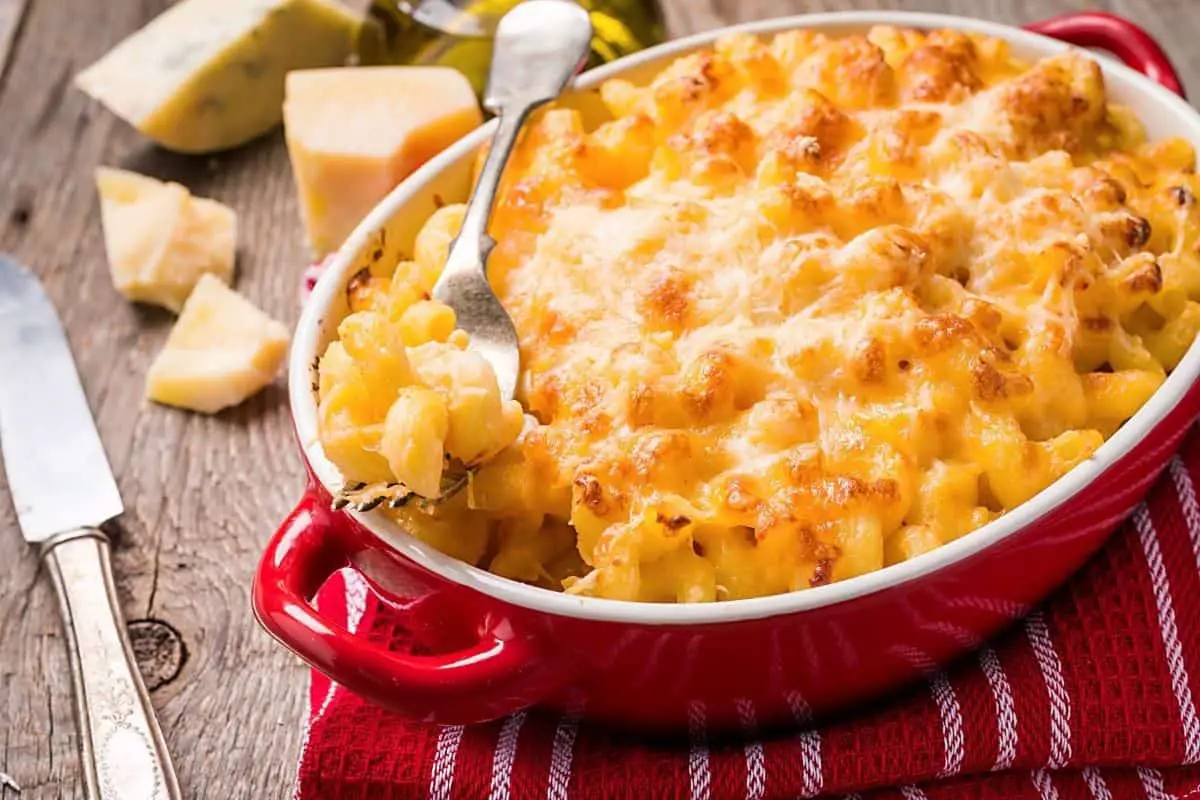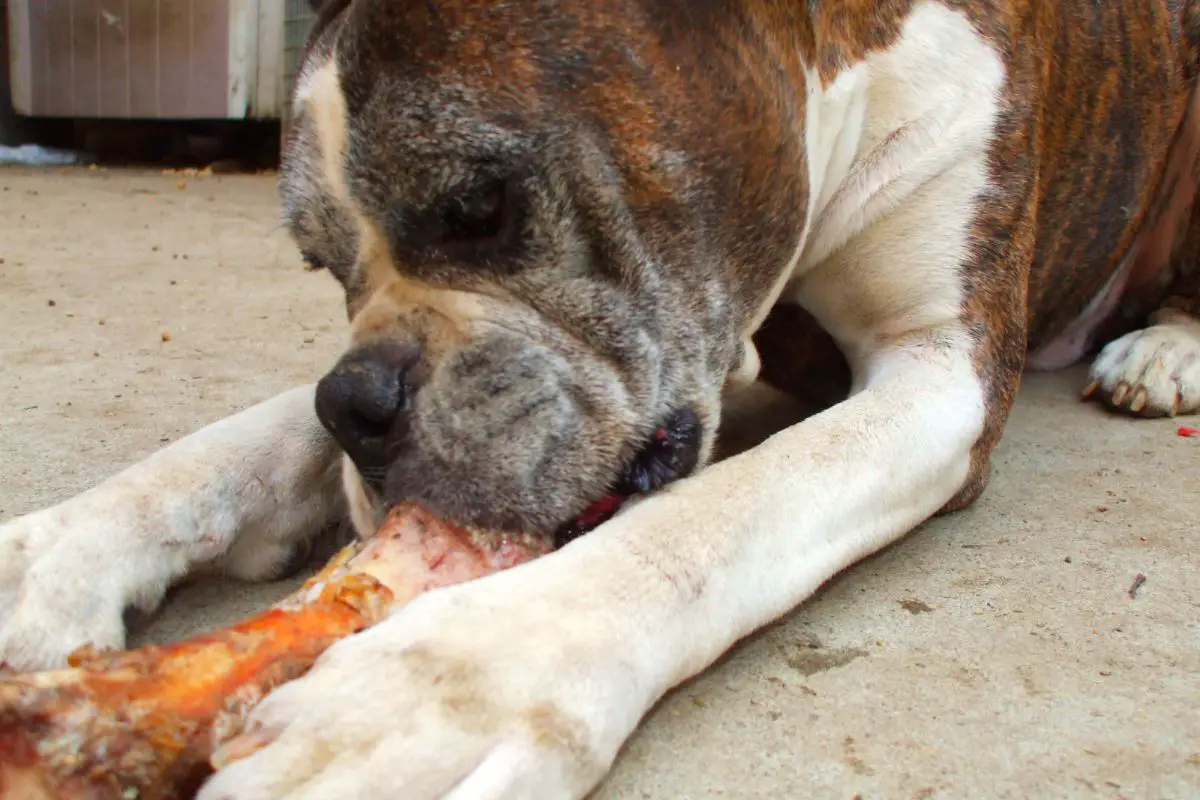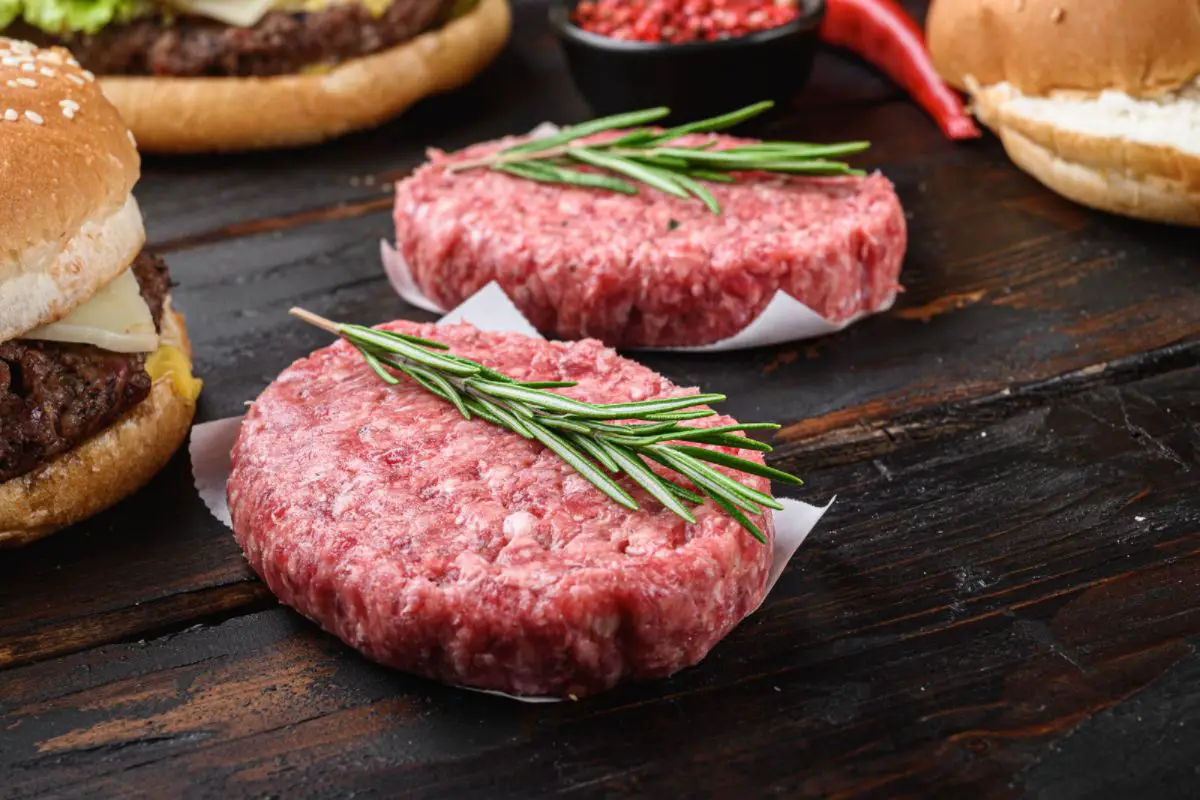This post contains affiliate links.
A nice warm bowl of creamy mac and cheese is the perfect comfort food. It’s delicious – so delicious, in fact, that you may be tempted to treat your furry friend to some as well. However, can dogs eat mac and cheese?
Dogs can eat mac and cheese, but it’s not a healthy option and shouldn’t be fed to your pups regularly. Mac and cheese contain ingredients, such as dairy and sugar, that can cause health issues if given in big amounts. It also contains wheat, which can be dangerous for dogs with gluten allergies.
Find out more about why you shouldn’t feed your dog macaroni and cheese (even just a tiny portion), what other foods to never give your dog, and more information about better choices of treats for your canine companion.
Table of Contents
Is Mac and Cheese Safe for Dogs To Eat?
Many of us like to feed our dogs table scraps or give them a little treat now and then. If your dog has eaten some mac and cheese, either on purpose or accidentally (as we all know, sometimes dogs will just stick their noses where they shouldn’t!), they won’t die.
Mac and cheese isn’t poisonous for dogs, but it’s also not something they should be fed regularly (and it definitely shouldn’t be their whole meal) because it contains many ingredients that aren’t healthy for your pups to consume. Mac and cheese is also a very fattening food for dogs and can lead to excessive weight gain if fed to them too often.
Furthermore, mac and cheese doesn’t have enough proper nutrients to promote a healthy diet. Too much of it can lead to digestive issues, stomach aches, and more.
What Ingredients in Mac and Cheese Are Bad for Dogs?
There’s a reason why dog foods don’t contain ingredients such as dairy and sugar – it really isn’t good for our pets at all. Most of what’s in mac and cheese are bad for your dog, but the items below can cause your canine friend to suffer if they keep eating pasta in large quantities.
Dairy
Did you know that most dogs are actually lactose intolerant? This means that if they’re chowing down on dairy-rich foods like mac and cheese, they’re very likely to suffer from a host of unpleasant side effects such as flatulence, diarrhea, and vomiting. So, what was intended as a treat actually becomes more like a punishment for your poor dog.
Another negative thing about cheese, in particular, is that it is a very fatty food. We know that we shouldn’t eat too much cheese because it’ll cause us to gain weight, but it’s doubly true for dogs. Not only can they start stacking on the pounds if fed too much cheese, but your pet can also actually develop nasty, life-threatening conditions such as pancreatitis.
Wheat
Wheat is the primary ingredient used in most dry dog foods, so you may be wondering why it has ended up on this list. In general, wheat isn’t bad for most dogs, but some do have gluten allergies, just like people.
The signs of gluten intolerance in dogs include signs of digestive distress such as diarrhea, fatigue and low energy, poor coat condition and maybe even fur loss, and poor body condition such as being very thin.
If your dog hasn’t been diagnosed with gluten intolerance, but you suspect that they might have one, make sure to take them to the vet for a proper diagnosis as soon as possible. An untreated gluten allergy will wreak havoc on your pup’s health and can even result in death.
If your dog has a gluten intolerance, you should definitely avoid giving it mac and cheese and other foods containing wheat. Thankfully, there are many grain-free diet options for dogs these days.
Note: Another reason wheat can be bad for dogs is it can clog their digestive system. Mac and cheese is packed with carbohydrates from wheat, so it can make them overweight quickly.
Sugar
Sugar is as bad for dogs as it is for humans, and it can be present in packaged macaroni and cheese. If a dog has sugar, it can cause problems, such as dental problems, as they can’t brush their teeth unless you do it for them. Sugar can also cause digestive issues such as diarrhea.
Additionally, feeding a dog sugar will cause weight gain, which has its own associated problems. An overweight dog is at risk of developing diabetes, and excessive weight can also cause issues with a dog’s joints.
Many mac and cheese brands also add sugar to boost the flavor profile, and it can be quite detrimental for dogs.
Salt
One ingredient that can be present in high amounts in macaroni and cheese, especially the packaged varieties, is salt. In small amounts, salt is perfectly fine for dogs and is actually beneficial for their diet, just like it is with humans.
However, just like humans, too much salt is bad news for dogs, as salty food can make your dog incredibly thirsty and potentially dehydrated. It can also lead to digestive upsets like vomiting and diarrhea. Additionally, too much salt can cause hypernatremia (iodine poisoning), which can cause convulsions and even cost your poor dog their life.
If your dog eats mac and cheese, make sure they drink plenty of water.
Artificial Colors and Flavorings
If you’re serving your dog mac and cheese made from a packet mix, the cheese powder you use to make it has more of a risk to your dog than just containing dairy. These cheese powders are full of artificial colors and flavors that aren’t very good for your dog at all.
Artificial colors and flavors can cause vomiting, constipation, and diarrhea, and some dogs can have more serious allergic reactions that can give them an itchy skin rash. If processed food isn’t good for us, it’s not good for our furry friends either.
What Should You Do If Your Dog Ate Mac and Cheese?
If your dog ate some mac and cheese accidentally, or you gave them some as a treat without knowing that it’s a bad idea, you shouldn’t worry. A small amount is likely not going to make your dog sick unless your pup has a gluten allergy or has lactose intolerance.
Monitor Symptoms
If your dog ate a big amount of mac and cheese, there’s a higher chance that they’d get sick. Keep an eye on your dog over the next few hours to see if they show any symptoms of allergic reaction or illness.
For symptoms such as diarrhea and vomiting, make sure to provide your dog with plenty of water so that they won’t become dehydrated. When you’re sure that they’ve stopped displaying these symptoms, try to feed them small amounts of dry food. If the digestive issues don’t go away after a few days, or if they get worse, take your dog to the vet as soon as possible.
Take Them to the Vet Immediately for Serious Symptoms
For more severe symptoms such as rashes, hypernatremia, or if you suspect your dog may have a condition such as gluten intolerance, take them to the vet immediately. You shouldn’t ignore these conditions because they can quickly become life-threatening if not managed properly.
You should also take your dog to the vet if the mac and cheese they ate contains any ingredients that are known to be toxic to dogs, such as onions and garlic. Even in small quantities, ingredients such as these can have a terrible effect on your dog’s health.
Can Dogs Eat Plain Macaroni?
Now that you know why you shouldn’t feed your dog mac and cheese, you may wonder if feeding them plain boiled macaroni pasta is alright. The answer to that is yes, it’s okay for dogs, but only in small amounts.
Too much pasta, even if it’s just plain, can be bad for dogs and cause problems such as weight gain. It can also make your dog feel sluggish and slow their metabolism. Of course, if your dog has a gluten allergy, you should never give them pasta or any products with wheat.
Can Dogs Eat Other Kinds of Pasta Dishes?
If you’re eating something like spaghetti Bolognese for dinner, it can be tempting to give your dog a little bit of it too. After all, pasta dishes like that contain meat, so they’re probably better for your dog than mac and cheese anyway, right? Not really. In fact, other kinds of pasta dishes such as spaghetti Bolognese or puttanesca can be even worse than mac and cheese for your dog.
These kinds of pasta dishes contain ingredients that can be toxic for dogs, such as onion and garlic, or can have ingredients that pose a choking threat, such as olives. They also tend to have a high salt and fat content, which can cause a range of issues for your pooch. Overall, just like mac and cheese, it’s best to avoid giving dogs pasta as a treat.
What Other Human Foods Are Bad for Dogs?
Mac and cheese isn’t the only food that you should avoid giving to your dogs. If you’re considering giving them some human food as a treat, steer clear of the following:
- Avocado: These can cause digestive issues for dogs, such as vomiting and diarrhea. If they manage to get hold of a whole avocado, they can easily choke on the seed, so be wary.
- Xylitol: This is an artificial sweetener found in many sugar-free products. It can cause digestive issues and also severe problems such as liver failure.
- Onions, garlic, and chives: While you’re probably not going to give your dog a whole raw onion to chow down on as a treat, be wary of giving them anything that could have onions, garlic, and chives as ingredients – for example, pasta, casseroles, or even potato chips. Dogs can become anemic or get poisoned from overeating these.
- Grapes and raisins: It may be tempting to use grapes and raisins as training treats because they’re small, and it’s easy to carry a packet of them with you, but be mindful that they can cause kidney failure and are fatal to dogs.
- Macadamia nuts: It only takes a small number of macadamia nuts to make a dog very ill, so avoid giving them anything that could contain macadamias as ingredients.
- Chocolate: This is one that most people already know about, but chocolate is bad news for dogs. Problems caused by eating it can range from digestive issues to seizures.
- Raw meat or eggs: The main problem with giving your dog raw meat or eggs is the potential bacteria that may be present. Lean meat is okay to give to dogs in moderation, as long as it’s cooked first.
- Cooked bones: Have you heard the old saying, “give a dog a bone?” Well, don’t give a dog a cooked bone, as the bones can splinter off in the dog’s stomach and cause serious digestive issues. They can also pose a choking hazard.
- Fat trimmings: While it may seem like a tasty treat for your dog, fat trimmings aren’t good for them. They can cause digestive problems and can also lead to excessive weight gain.
Healthy Treats Your Dogs Can Eat
If you want to give your dog a treat, there are much better options than mac and cheese or anything else listed above. You have so many choices for easy homemade treats, usually using ingredients you already have around the house. You can also choose from the many healthy snacks that you can buy for your dog from pet stores or online.
Keep in mind that dogs should only ever be given treats in moderation. Even though these are much healthier options than mac and cheese, too much of a good thing can still be bad.
Here are some of our favorite choices.
Easy Homemade Treats for Your Dog
- Watermelon. Most dogs love a bite of sweet, crispy watermelon. They can have it raw, or for a great way to cool down your pal on a hot day, freeze some slices of watermelon for it. Just make sure you either remove the seeds or buy a seedless watermelon and get rid of the rind because it can cause a stomachache for your dog.
- Carrots. Dogs love to crunch on carrots, and they can be a great alternative to bones if you want to give your dog something safe to chew on. Carrots are also excellent treats for dogs because they require no preparation – pups can eat the skin and even the leafy carrot tops with no issues at all!
- Green beans or peas. If you’re looking for an alternative to store-bought treats to use when training your dog, green beans or peas can be a good choice. They’re small enough to use as rewards, and you can easily carry a little container of them with you when you’re at training sessions. Dogs can eat green beans or peas in any way – raw or cooked.
Great Store-Bought Treats for Your Dog
Old Mother Hubbard Original Assortment Mini Dog Biscuits
These teeny-tiny little dog biscuits are made of tasty all-natural ingredients such as peanut butter and apple – all things that you can give to your dog as treats by themselves. While you shouldn’t feed them to your dog as their primary food source, they’re great for putting on top of wet food (particularly for fussy eaters), and you can use them as training treats.
Milk Bone Original Treats
Milk bone biscuits are such a classic staple when it comes to dog treats that you probably have a packet of them in your cupboard already! There’s a reason why they’re so well-known and well-loved; they’re not only a good treat, they’re also good for your dog’s teeth. However, only give these to your dog in moderation – one or two a day should be the limit.
Three Dog Bakery Cookies With Carob Flavoured Chips
You’d probably agree that chocolate chip cookies are delicious, so why not give your dog a treat that you’d love to eat yourself! These cookies are made from natural, safe ingredients like carob, which is a sweet chocolate substitute that your dog will find so tasty. Best of all, carob poses none of the risks that chocolate does to dogs. Only give your pup these treats in moderation, though.
Final Words
Mac and cheese shouldn’t be given to dogs as a treat because it just isn’t good for them. Something that was supposed to be a pleasant experience for your pet could end up causing them problems instead.
If your dog has eaten large quantities, they may be more likely to become ill. Watch your dog carefully for any symptoms, and take them to the vet right away if you think there’s something wrong with them.
Find a treat that’s safe for your dog, and you won’t only be making them happy, but you’ll be keeping them healthy too.
Related Articles
- Can Dogs Eat Beef Jerky? (We Ask the Experts)
- Is Bologna a Good Dog Treat? (We Find Out)
- My Dog Ate Vienna Sausage. Will He Be Okay?
- Can Dogs Eat Cloves? Is It Toxic?
- Can Dogs Eat Doritos? Should They Really?
Sources
- Love Your Dog: Can Dogs Eat Macaroni and Cheese? They Can, But They Shouldn’t
- Pet Helpful: 10 Common Human Foods That Can Kill Your Dog
- Doggie Designer: Can Dogs Eat Mac and Cheese? Is Mac and Cheese Safe for Dogs?
- Dog Hint: Can Dogs Have Mac and Cheese?
- Fetch by WebMD: Foods Your Dog Should Never Eat
- American Kennel Club: Can Dogs Eat Wheat?
- GreenPet: Is Your Dog Gluten Intolerant?
- Fetch by WebMD: 6 Reasons Why Your Dog Shouldn’t Have Sugar
- Tails: Is Salt Bad for Dogs?
- Falls Village Veterinary Hospital: 11 Healthy, Natural Treats for Dogs in Your Kitchen
- American Kennel Club: Human Foods Dogs Can and Can’t Eat
- American Kennel Club: Pancreatitis in Dogs – Symptoms, Causes & Treatment
Mrdogfood.com is a participant in the Amazon Services LLC Associates Program, an affiliate advertising program designed to provide a means for sites to earn advertising fees by advertising and linking to Amazon.com. We also participate in other affiliate programs which compensate us for referring traffic.







